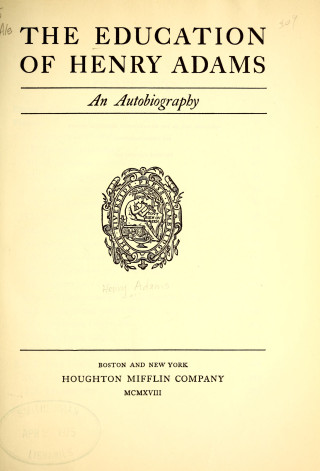Though Adams struggled, albeit with ambivalence, to break free of a personal history that was intimately tied to that of the country, he knew he never could. Nor can he now. In the most recent Adams biography, The Last American Aristocrat, David S. Brown, a professor of history at Elizabethtown College in Pennsylvania, depicts him as “the beneficiary of Adams privilege, Brooks wealth [on his mother’s side], and a Harvard education” who “wished to resume an indelible family fiefdom.” Bitter about “civilizational decay,” Adams “sought the knight’s armor of a sufficiently sharpened pen” and hankered after “the simple agrarian republic, now in its death throes.” In Brown’s telling, the Saint-Gaudens figure represents “nothing less than a defiantly idealized monument to the history and traditions of a vanishing preindustrial people.”
Dividing his book into two sections—“Becoming Henry Adams” and “Performing Henry Adams”—Brown explains that the first “assays its subject” before the suicide of Adams’s wife in 1885; the second takes up what Adams called his “posthumous life.” Those remaining thirty-three years are characterized, Brown writes, by a “drift of persistent travel, darkening meditations on capitalism’s quickening pace, and a taste for playing with personas” that were “‘primitive’ and skeptical of the automated age.” (Brown is fond of scare quotes.) Adams nonetheless “embraced the fruits of invention,” Brown continues, “traveling in the latest Mercedes, the fastest Union Pacific luxury train cars, and the smoothest steamships (purchasing a never-used ticket for the Titanic’s return voyage).” The adjectives—“latest,” “fastest,” “smoothest”—suggest a certain disdain. Brown sees Adams not just as a writer who “yielded a harvest as rich, complicated, and varied as any American thinker at any time” but as a white plutocrat inexorably exercising his privilege.
During those thirty-three years, Adams completed his masterly History of the United States During the Administrations of Thomas Jefferson and James Madison (1889–1891) in nine well-researched volumes, as well as two literary chronicles, Mont Saint Michel and Chartres and the Education. He composed a paper arguing for Cuban independence that was read to the Senate Foreign Relations Committee, helped John Hay’s widow edit her husband’s correspondence, and reluctantly accepted a commission to write a memorial biography of George Cabot Lodge, the son of his former student Henry Cabot Lodge. At the same time, particularly in the 1890s, Adams spewed an odious and depressing anti-Semitism. “Tinctured with snobbery and self-pity, elitism and, particularly of those inscribed during the economic depression that followed the Panic of 1893, Jew-baiting,” Brown writes, Adams’s published letters (six huge volumes) also include “a raft of arresting observations, and readers will have to decide for themselves if Adams’s insights on his country and its evolving cultural apparatus outweigh his arrogance.”
